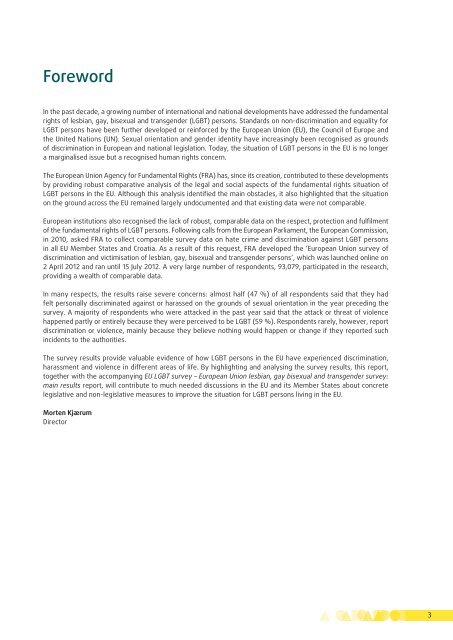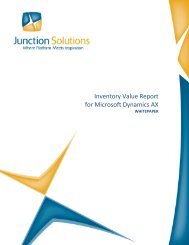EU LGBT survey - European Union Agency for Fundamental Rights
EU LGBT survey - European Union Agency for Fundamental Rights
EU LGBT survey - European Union Agency for Fundamental Rights
Create successful ePaper yourself
Turn your PDF publications into a flip-book with our unique Google optimized e-Paper software.
ForewordIn the past decade, a growing number of international and national developments have addressed the fundamentalrights of lesbian, gay, bisexual and transgender (<strong>LGBT</strong>) persons. Standards on non-discrimination and equality <strong>for</strong><strong>LGBT</strong> persons have been further developed or rein<strong>for</strong>ced by the <strong>European</strong> <strong>Union</strong> (<strong>EU</strong>), the Council of Europe andthe United Nations (UN). Sexual orientation and gender identity have increasingly been recognised as groundsof discrimination in <strong>European</strong> and national legislation. Today, the situation of <strong>LGBT</strong> persons in the <strong>EU</strong> is no longera marginalised issue but a recognised human rights concern.The <strong>European</strong> <strong>Union</strong> <strong>Agency</strong> <strong>for</strong> <strong>Fundamental</strong> <strong>Rights</strong> (FRA) has, since its creation, contributed to these developmentsby providing robust comparative analysis of the legal and social aspects of the fundamental rights situation of<strong>LGBT</strong> persons in the <strong>EU</strong>. Although this analysis identified the main obstacles, it also highlighted that the situationon the ground across the <strong>EU</strong> remained largely undocumented and that existing data were not comparable.<strong>European</strong> institutions also recognised the lack of robust, comparable data on the respect, protection and fulfilmentof the fundamental rights of <strong>LGBT</strong> persons. Following calls from the <strong>European</strong> Parliament, the <strong>European</strong> Commission,in 2010, asked FRA to collect comparable <strong>survey</strong> data on hate crime and discrimination against <strong>LGBT</strong> personsin all <strong>EU</strong> Member States and Croatia. As a result of this request, FRA developed the ‘<strong>European</strong> <strong>Union</strong> <strong>survey</strong> ofdiscrimination and victimisation of lesbian, gay, bisexual and transgender persons’, which was launched online on2 April 2012 and ran until 15 July 2012. A very large number of respondents, 93,079, participated in the research,providing a wealth of comparable data.In many respects, the results raise severe concerns: almost half (47 %) of all respondents said that they hadfelt personally discriminated against or harassed on the grounds of sexual orientation in the year preceding the<strong>survey</strong>. A majority of respondents who were attacked in the past year said that the attack or threat of violencehappened partly or entirely because they were perceived to be <strong>LGBT</strong> (59 %). Respondents rarely, however, reportdiscrimination or violence, mainly because they believe nothing would happen or change if they reported suchincidents to the authorities.The <strong>survey</strong> results provide valuable evidence of how <strong>LGBT</strong> persons in the <strong>EU</strong> have experienced discrimination,harassment and violence in different areas of life. By highlighting and analysing the <strong>survey</strong> results, this report,together with the accompanying <strong>EU</strong> <strong>LGBT</strong> <strong>survey</strong> – <strong>European</strong> <strong>Union</strong> lesbian, gay bisexual and transgender <strong>survey</strong>:main results report, will contribute to much needed discussions in the <strong>EU</strong> and its Member States about concretelegislative and non-legislative measures to improve the situation <strong>for</strong> <strong>LGBT</strong> persons living in the <strong>EU</strong>.Morten KjærumDirector3



